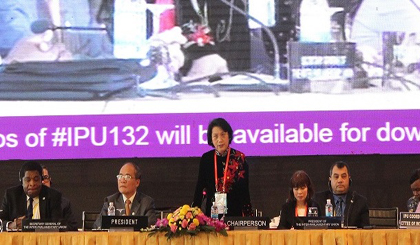Women parliamentarians gather to discuss women's progress in Hanoi
Women parliamentarians from across the world gathered in Hanoi on March 28 at the Women Parliamentarians’ Meeting as part of the Assembly of the 132nd Inter-Parliamentary Union (IPU-132) hosted by Vietnam for the first time.
Vice Chairwoman of the Vietnam National Assembly Nguyen Thi Kim Ngan, also Chairwoman of the 21st Women Parliamentarians’ Group, chaired the meeting.
 |
| NA Vice Chairwoman Nguyen Thi Kim Ngan chairs the meeting. |
Addressing the opening ceremony, NA Chairman Nguyen Sinh Hung praised the meeting’s theme — the 20-year implementation of the Beijing Declaration and Platform for Action — signed by 189 governments, calling for the removal of all obstacles to women’s active participation in all spheres of public and private life. The Platform is committed to equality, peace and development with 12 strategic targets on empowering and enhancing the progress of women around the world.
The meeting was an opportunity to review the Platform’s 20-year implementation, parliaments’ role in realising the commitments and the institutionalisation of national laws to create effective oversight mechanisms and allocate resources for implementation, Chairman Hung said.
Discussions on the theme support the IPU-132’s theme “Sustainable development goals: Turning words into action” to make suggestions and build future targets, the top legislator added.
Chairman Hung stressed the country’s consistent policy of gender equality and empowerment for women, noting that the percentage of women’s participation in the NA during the four most recent tenures reached around 25% and the Vietnamese NA has made contributions to gender equality in the country and around the world.
He expressed his hope that delegates would make suggestions and initiatives to create favourable conditions for promoting gender equality in each nation and in the world.
The meeting would contribute to the Assembly’s resolutions to be approved after being considered and discussed by women parliamentarians, Chairman Hung added.
IPU President Saber Chowdhury highlighted the opportunities for women parliamentarians to share their views on parliamentary issues and contribute to resolving the world’s emerging issues.
During the meeting, delegates heard reports on discussions of the Coordinating Committee’s meeting on October 16, 2014 in Geneva, elected a regional preparatory member for the Asia Paciffic Group, a replacing member for the Africa Group, a preparatory member for the Arab Group and members of other vacancies. They also discussed contributions to the IPU-132’s activities and marked the 30th anniversary of the IPU Meeting of Woman Parliamentarians.
According to the IPU’s 20-year review of women’s participation in parliaments, the global average rate of participation has nearly doubled from 11.3% in 1995 to 22.1% in 2015, remaining slow in its progress. The Beijing Platform for Action set a 30% target for women in decision-making roles, to be achieved through a wide range of strategies, including positive action, public debate, training and mentoring for women as leaders.
The number of single and lower houses with over 30% women parliamentarians grew from five to 42, and those with over 40% from one to 13. By 2015, four houses of parliament surpassed the 50% threshold while one moved beyond 60%.
The world’s highest ranking countries have become more diverse: the top 10, dominated by eight European countries in 1995, now include four in Sub-Saharan Africa and three each in the Americas and Europe.
Meanwhile, far fewer single and lower houses elect less than 10% women, dropping from 109 in 1995 to 38 in 2015. The number of all-male single and lower houses fell from 10 to five.
In addition to shifting political circumstances, a crucial factor driving these changes has been the adoption of electoral gender quotas, which have grown from only a small number of nations in 1995 to over 120 in 2015.
(Source: nhandan.org.vn)
 về đầu trang
về đầu trang







